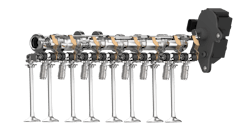Senate hearings on automated vehicles (AVs) on June 14 did not provide any new insights on what Congress should be doing beyond what most everyone has already agreed on: figure out how to prevent the 70 bills introduced in 30 states from becoming, what Mitch Bainwol, called "a recipe for disaster."
Leaders of the committee, both Republicans and Democrats, have long recognized the problematic regulatory conflicts developing between the states and the federal government. They addressed that issue, vaguely, in the bare bones Principles for Bipartisan Legislation on Self-Driving Vehicles they released the day before the hearings.
But issues such as the state vs. federal regulatory conflicts, safety requirements, and personal data security will not be solved, much less encoded in congressional legislation, any time soon. And maybe they don't have to be since even level 4 AVs (level 5 will be the highest) won't be on the road until at least 2021. The near-term imperative is support for testing and deployment, be that legislation liberalizing FMVSS exemptions, which cap testing at 2,500 autos, and federal funding.
One good area for federal AV investment now might be the 10 automated vehicle proving grounds (AVPG) the Department of Transportation announced in January, in the waning days of the Obama administration. The American Center for Mobility (ACM) in Ypsilanti, Mich., is one of them. Others are the Thomas D. Larson Pennsylvania Transportation Institute at Penn State University and the Texas AV Proving Grounds Partnership.
There was no federal funding attached to the AVPG program when it was announced, and there is none in the Trump administration budget for fiscal 2018, the year that begins on October 1, 2017. Moreover, President Trump has proposed a 7.5 percent reduction in the budget of the National Highway Traffic Safety Administration (NHTSA) for fiscal 2018. So it is hard to see how the NHTSA will find any funding for the 10 proving ground pilot sites, whose funding streams are unknown, but whose objectives are large.
Neither the Larson Institute nor the Texas program responded to inquiries about funding and operations. However, the Pittsburgh location, for example, starts out with significant challenges since Uber has a proving track in Pittsburgh where it tests AVs and has no plans to use the Larson track, which has been mostly used to test truck emissions. Uber did not respond to a request for comment.
John M. Maddox, President and CEO of the ACM, testified at the Senate Committee on Commerce, Science, and Transportation hearings on June 14. Maddox said federal funding is necessary if the U.S. is going to maintain its lead in AV technology, with China, Korea and the European Union pursuing it aggressively. China has two proving grounds and is adding five more, for example, and they ostensibly are receiving government funding, though Maddox did not quantify that support.
Maddox explained, "U.S. investment in AVPG infrastructure, facilities, equipment, and programs is a vital necessity to ensure safe deployment of AVs, and to keep the U.S. competitive with other major auto-manufacturing countries who are investing in similar facilities and infrastructure at a much more rapid pace."
Sens. Gary Peters (D-MI) and Thom Tillis (R-NC) sent a letter to Senate Transportation Appropriations Subcommittee Chair Susan Collins (R-ME) and Ranking Member Jack Reed (D-RI) calling for increased funding to support the advancement of connected and automated vehicle (CAV) technologies. The letter specifically calls for Congress to appropriate funding for the safe development and testing of CAV technologies at U.S Department of Transportation federally designated proving grounds.
Appropriations bills start in the House and then go to the Senate. The House Transportation Appropriations Subcommittee had its first hearing on June 15. So it will be a while before it becomes clear whether the AVPG program will receive federal funding.
Subscribe to Aftermarket Business World and receive articles like this every month….absolutely free. Click here.

